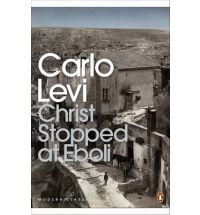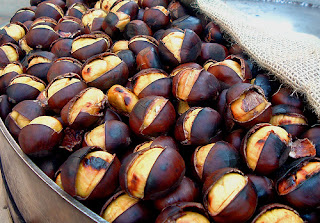Christ stopped at Eboli by Carlo Levi was first published in 1945 and is a first-hand account of the author's exile in the towns of Basilicata during 1935-1936. I'm not sure why I chose it really. I guess one reason is curiosity. I've never been further south than Sorrento in Italy, and from speaking to my Nonna-in-law, I know Italy in 1935 was a very different place. I guess then, I wanted to see a different Italy, separated in space and time, to that which I see today, just to get some perspective. Anyway, enough about me, what about the book?
Due to his anti-fascist beliefs and activism, Carlo Levi was banished to essentially the middle of nowhere by Benito Mussolini. A native of Turin, the medical doctor initially struggles to adapt to his new surroundings, feeling like a fish out of water. He entered a world centuries away from his own, cut off from the state, with it's own cycles of sorrow and hardship, where the people seem to be from a completely different country, relying on ancient folklore and witchcraft, rather than religion and imperial order. Slowly, perhaps predictably, he begins to see past the outward differences in clothing and mannerisms to understand the people. From the ambitious local 'gentlemen', trapped in generational pretty squabbles over local disputes, to the commoners, working long hours under the unrelenting sun. While the premise may sound a little formulaic, the book is so well written, both in terms of prose and in terms of historical documentation, that I found it hard to put down. Dr Levi observes the locals, befriends them, and very quickly loses his prejudice and outsider tag. He spent little over a year in Lucania (now, roughly, Basilicata), staying in two towns, Gagliano, and Grassano, spending his time talking to the locals and indulging in writing and painting both the people and the barren landscape they inhabit.
The title of the book comes from the fact that Christianity (read civilisation) appears to have stopped in a small town, about half-way between Naples and the town of Gagliano, called Eboli. The locals of Gagliano don't consider themselves part of Italian society, nor Christians, and indeed, use the two terms synonymously. That's it. This is all the book is about. Doesn't sound much does it? The book doesn't really go anywhere, there isn't really a plot, a murder mystery to solve, or anything like that, but it's none the poorer for it. Dr Levi details the local culture, from the casual approach to sex to the coming of the pig doctor, with local rivalries, mystical townsfolk, witches, crestfallen priests and rampant malaria all added to the palette of personalities that grace the page.
In the end, the book is all about the journey, rather than the destination, and despite my initial annoyance that it was a bit slow and not going anywhere, I was sad when I finished it, as I was completely submerged into the strange, anachronistic world in which Levi found himself. For this, and for the richness of the language and the pleasure I had through being immersed in 1935 Lucania, I can heartily recommend this book.
Christ stopped at Eboli by Carlo Levi should be available in all good book shops (or can be bought from Amazon here) and is published by Penguin books.
The other September reviews in the Italy in Books challenge can be found here.



